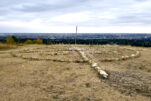Election crystal ball: UCP in Alberta; Trudeau stays as PM
By Medicine Hat News Opinon on January 5, 2019.
With 2018 now in the rearview mirror, Albertans are entering a year with a provincial and federal election each scheduled. Predictions are a fool’s errand — get them wrong and you feel silly; get them right and nobody remembers. But somebody’s got to make them, so here they are. Alberta conservatives will be pleased and unsurprised to hear that Premier Rachel Notley will very likely not win another term this year. This will be the first time in Alberta’s history that a ruling party is one-and-done. Only five parties have ever ruled the province, all with majority mandates. It may surprise many readers, given the toxicity of their brand in Alberta and single seat in the provincial legislature, that the Alberta Liberal Party was the first government in this province, ruling from 1905-1921 Next was the United Farmers of Alberta, which was in power from 1921-1935, followed by the ultraconservative Social Credit from 1935-1971 and then the 44-year PC dynasty from 1971-2015. Alberta is an overwhelmingly conservative province, or at least has been for the past 84 years, even with an NDP government that received 40 per cent of the vote in 2015. With the NDP’s two conservative challengers united in a single party, Notley will have a very tough road to re-election. Although she may perform better than people expect, it won’t be enough to make her premier again. The United Conservative Party will undoubtedly sweep rural Alberta, while the NDP will take most, if not all, Edmonton’s seats. Whichever way Calgary goes, so too will the provincial election. Given the centrality of the oil and gas industry to that city’s economic fortunes and its disproportionately high unemployment numbers (8.2 per cent, compared with 6.8 provincially and 6.3 federally), it’s likely many Calgarians will try their lot with the UCP, handing them the election. But we must remember that the rest of the country isn’t Alberta, which brings us to the federal election. Prime Minister Justin Trudeau will win another term, but the extent of his victory will depend on the fortunes of the NDP and Maxime Bernier’s Peoples’ Party. Yes, Trudeau is highly unpopular in Alberta. He has just four seats in the province — two in Calgary and two in Edmonton — and it wouldn’t be surprising if he lost all four in 2019. The most recent polling data from Abacus shows him with an approval rating of 25 per cent in this province, compared with 42 per cent nation-wide. But, for better or worse, federal elections aren’t won or lost on the Prairies. If Ontario, Quebec and British Columbia go red, as they did in 2015, Trudeau will have another majority government. If the NDP, which is facing political oblivion in Quebec, performs well in Ontario and B.C., Trudeau could be in trouble. Fortunately for the prime minister, NDP leader Jagmeet Singh could come in third place in the Burnaby byelection to replace Vancouver mayor and former NDP MP Kennedy Stewart in parliament. As a harbinger of the NDP’s performance in the general election, this couldn’t be better news for Trudeau. And if Bernier’s xenophobic vanity project does well in his homebase of Quebec, where anti-immigrant sentiment is high, peeling away Conservative support, Trudeau will be in good electoral shape. That said, if the election of U.S. President Donald Trump and the U.K.’s vote in favour of Brexit taught us anything, it’s that polls and predictions ought to be taken with a grain of salt. (Jeremy Appel is a News reporter. To comment on this and other editorials, go to https://www.medicinehatnews.com/opinions.) 23-22




